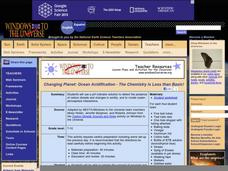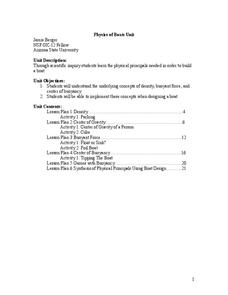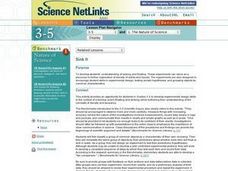Discovery Education
Make it all Better!
Discover how innovations can help your school and community. In the three-part STEM lesson, scholars learn the meaning of innovation and brainstorm innovations in their schools. They identify issues in their communities and think of...
American Psychological Association
Resource Vetting Rubric
How do you assure that the resources you find for your classes are of good quality? Check out a vetting rubric that suggests eight questions to ask when considering lesson plans, activities, demonstrations, and pictures for classroom use.
Curated OER
We're Off To the Races!
Second graders use a magnet to "race" objects from one side of a racing track to another. They predict what the results are, then run the race. Pupils sort and graph which items were successfully moved, they attempt to race again. This...
NASA
Foam Rocket
When going for distance, does it make a difference at what angle you launch the rocket? Teams of three launch foam rockets, varying the launch angle and determining how far they flew. After conducting the series of flights three times,...
Journey Through the Universe
How Far is Far?
The earth only revolves around one thing — and it's not any of your pupils. The lesson includes two activities dealing with the distance to the sun and the moon. First, scholars create a pin hole camera and use the rules of similar...
Cornell University
Mechanical Properties of Gummy Worms
Learners won't have to squirm when asked the facts after completing an intriguing lab investigation! Hook young scholars on science by challenging them to verify Hooke's Law using a gummy worm. Measuring the length of the worm as they...
Curated OER
Wildflower Beautification Project
Students, in cooperative groups, design and create a wildflower garden for the community. They write letters to property owners requesting use of their land and then write invitations to their parents and to local, state, and federal...
Curated OER
Recognizing Litter
When does trash become litter? Use this litter awareness lesson to help them understand the importance of trash disposal. Get learners engaged by reading Nancy Loewen's Lady Lulu Liked to Litter (not included). After discussing what...
Columbus City Schools
Experiencing Eclipses
Don't be caught in the dark! Young scientists investigate the causes of both solar and lunar eclipses using an interactive to help them understand the development of an eclipse over time. They then research facts and characteristics of...
Curated OER
Solar Sweet Tea
Students study the sun. In this heat energy lesson, students use the sun's warmth to make tea. They place a few jars with tea bags and water in the sun and discuss what the sun is doing to the water while they wait for the tea to brew....
Curated OER
Changing Planet: Ocean Acidification - the Chemistry is Less than Basic!
A video and laboratory investigation are highlights to this lesson on acidification of ocean water due to increased atmospheric carbon dioxide. Using bromothymol blue (BTB) as an indicator, pupils analyze the amount of carbon dioxide...
Curated OER
Exploring Geometric Figures
Tenth graders explore mathematics by participating in hands-on daily activities. Learners identify a list of different shapes and classify them by shape, size, sides and vertices. They utilize tangrams and geometric pieces to gain an...
Arizona State University
Physics of Boats
Let's go sailing! An instructive unit includes six lessons with multiple activities to teach scholars about density, center of gravity, buoyancy, and the Archimedes Principle. They can complete the final project of building a boat on a...
University of Colorado
Can Photosynthesis Occur at Saturn?
In the 19th activity of 22, learners determine if distance from a light source affects photosynthesis. Participants capture oxygen in straws and find that the amount of water the gas displaces is proportional to the rate of photosynthesis.
American Psychological Association
Using Psychological Perspectives to Answer Questions on Behavior
Perspective is everything when it comes to assessing human behavior. Class members examine a series of statements and identify the perspective represented by each to demonstrate their understanding of different psychological perspectives.
Tracy Pendry
Cardiovascular/Circulatory System
Explore the circulatory system with a cardiovascular pump activity that promotes discovery and discussion as class members create a functioning model of the heart. Continue the learning process through a web quest showcasing the body's...
Curated OER
Muscular and Skeletal Systems
How do muscles move bones? Find out using a built-in-class model. Pupils construct a hand model with paper and string, then follow a series of directions to explore the movement process. Discover additional information about the muscular...
Curated OER
Collecting Rocks
Students examine how rocks are formed, used, and how to collect them. They listen to and discuss the book, Let's Go Rock Collecting, sort rock samples, and collect rocks from home.
Curated OER
You Are What You Eat: Chemical Residues and Consumers
High schoolers determine how evidence gained from a simulated test for the presence of pesticide residues can be used to determine risk. They use peas to simulate pesticide residue testing.
Curated OER
Measure Up!
Discover ways to measure items without standard tools. In this measurements lesson, learners estimate how long certain objects are by measuring with a non-standard measuring tool. Young scholars check their estimates with a ruler and...
Curated OER
Tie Dye
Students practice writing research proposals to test the color fastness of a dye once it has been exposed to a t-shirt. Each proposal needs details of experimental design, length of treatment, and means of cleaning the shirt. All...
Curated OER
Minerals - The Building Blocks of Rocks
Students examine how rocks are composed of different minerals. They analyze rock samples, then examine cookies, sorting out the simulated mineral ingredients from the cookies and identifying the mineral ingredients.
Curated OER
Sink It
Introduce your class to the concept of sinking and floating. In groups, they classify objects after making predictions about which materials will sink or float. They record their results and create graphs and charts to share with the class.
Curated OER
Volcanoes in Space
Students research volcanoes on the Internet to compare/contrast the volcanoes on Earth to the ones found on Io, a moon of Jupiter. Students list the similarities and differences in science journals, and illustrate pictures of the volcanoes.

























